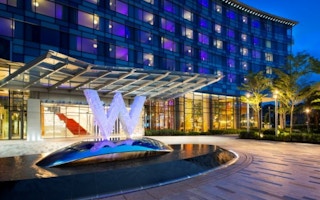Visitors to Singapore have a new, green option for their stay with the opening of the platinum-rated W Singapore hotel on the island of Sentosa.
Local property developer City Development Limited (CDL) revealed at a media briefing on Tuesday that the Starwood-owned W Singapore was the first new hotel to achieve the highest green building rating under the country’s Green Mark green building certification scheme.
“We are very happy to have found a like-minded operator in W Hotels group to manage the hotel,” said CDL managing director Kwek Leng Joo. He added that the two firms shared a commitment to take an innovative green approach for the long-term benefit of stakeholders.
The hotel is one of four properties that CDL has developed in the resort island’s Sentosa Cove neighbourhood. The others are The Residences at W Singapore condominiums, the Quayside Isle retail complex and The Oceanfront condominiums.
Together, the four properties will save more than S$3 million in electricity costs and S$165,000 in water costs each year, according to CDL estimates.
CDL designed the 240-room hotel to take advantage of natural ventilation and daylight, while at the same time minimizing the amount of solar heat entering windows during the day by careful orientation of the building facades and the use of large, shaded balconies.
The hotel’s green features include energy efficient air-conditioning, rainwater harvesting for irrigation and water-efficient plumbing fixtures. Automatic sensors in the guest rooms switch the air-conditioning to fan mode when the balcony door is left open. The hotel has extensive LED lighting, which helps reduce energy consumption and adds to the hotel’s design features.
W Singapore- Sentosa Cove general manager Stephane Fabregoul said that CDL had provided “great hardware”, referring to the buildings and their green features. “My responsibility is to work on the software,” he added.
W Hotels, known more for its emphasis on trendy design and music than eco-friendliness, has a target of achieving 30 per cent energy savings and 20 per cent in water savings by 2020.
Mr Fabregoul said the hotel, which opened on 16 September in time for Singapore’s annual night-time F1 racing event, plans to live up to its platinum-rated green design through initiatives that enhance recycling, limit food waste, reduce unnecessary laundry and promote environment-friendly event and meeting practices.
Meeting the hotel’s environmental targets will require the cooperation of guests and staff, which will depend on good communication, he noted.
He added that event organizers tended to choose venues with sustainability initiatives over comparably priced locations without green credentials.
The Hilton hotel group is also going the extra mile to provide green event venues by committing to offsetting the carbon emissions of all events held at 11 of its Southeast Asian hotels from 1 October.
Hilton’s Southeast Asian vice president of operations, William Costley, said in a statement on Monday that organizations were becoming increasingly concerned about the impact of their business and activities on the environment.
Companies such as the Hilton group that want to reduce their overall carbon footprint can purchase voluntary carbon credits to offset the emissions they are unable to avoid. The funds used to purchase the credits pay for low-carbon or renewable energy projects.
To offset emissions from its events in the 11 Singapore, Thailand and Malaysia hotels, the Hilton purchases carbon credits that fund clean-burning cookstoves in Cambodia and rainforest restoration in Malaysian Borneo.
Hilton tracks emissions from its events using software it developed to calculate the environmental impacts from its hotels. Using this system, the company saved more than US$74 million in utility costs globally in 2010.
Mr Costly said that the event offset programme gives organizations and individuals a sustainable choice for their conferences, meetings or social events.
“By offsetting carbon emissions - at no additional cost to our customers - together we are able to give back to the environment and benefit important renewable energy projects in the region,” he added.










